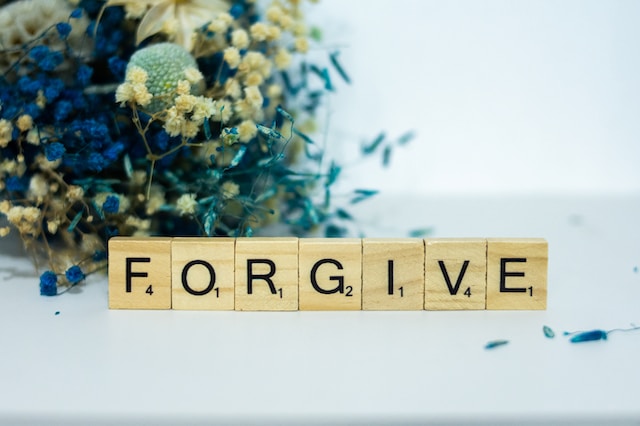In the tapestry of life, forgiveness is the thread that mends broken hearts and heals wounded souls. Imagine a world where grudges dissipate into a smoke, leaving behind clarity, peace, and a profound sense of liberation. Forgiveness, a seemingly simple word, possesses a transformative power that can elevate your mental well-being to unprecedented heights. In this exploration of the profound psychological benefits of forgiveness, we will unravel the intricacies of letting go while delving into research insights, and practical exercises to empower you on your personal journey of forgiveness.
I came across the concept while working with a psychologist and I found more details in a book I was going through for research. It seemed like a strange concept initially. Forgive? Does that mean acceptance? However, it’s not about approving an action when something bad was done to you.
As the year draws to a close soon, I believe the concept of forgiveness could resonate with my readers. If you’re wondering what is forgiveness, it’s definitely a deeper concept as we’ll soon delve into.
What is Forgiveness?
Emily, inspired by the wisdom of Clara, decided to embark on her own journey of forgiveness. As she navigated the discomfort that forgiving her betrayer brought, she discovered a newfound sense of freedom. It was not about allowing the wrongdoer to escape accountability; rather, it was about releasing the hold the past had on her. With each step toward forgiveness, Emily felt the weight on her shoulders lighten, making space for happiness and self-love.
At its core, forgiveness is a conscious decision to release feelings of resentment or vengeance toward someone who has harmed you. But its impact reaches far beyond the surface, infiltrating the intricate pathways of your mind, heart, and soul. Psychologically speaking, forgiveness is a complex process that allows you to reclaim power over your emotions, enabling you to break free from the chains of anger and bitterness.
Understanding the Psychology of Forgiveness
Researchers often cite the “forgiveness therapy” framework, emphasizing its ability to reduce anxiety, depression, and hostility. According to psychological theories, forgiving others can disrupt the cycle of negative emotions while replacing them with empathy, compassion, and understanding. By practicing forgiveness, you pave the way for enhanced self-esteem and improved relationships, nurturing an environment conducive to personal growth and emotional well-being.
As mentioned earlier, it does not mean you have to approve the wrong that was done to you.
The Discomfort of Forgiveness: A Necessary Step Towards Healing
Forgiveness, however, is not always an easy path to tread. In fact, it often comes hand-in-hand with discomfort. The mere thought of forgiving someone who has caused us immense pain can stir feelings of vulnerability, fear, and apprehension. It’s crucial to recognize that forgiveness does not imply condoning the wrongdoer’s actions or allowing them to continue hurting you. Instead, it is an act of self-empowerment. This is a conscious choice to let go of the burden that resentment imposes on your own well-being.
Why is forgiveness important? When you forgive, you acknowledge the pain inflicted upon you and take control of your emotional state. By refusing to let the actions of others dictate your feelings, you reclaim your power and liberate yourself from the shackles of victimhood. The discomfort that forgiveness brings is a testament to your strength and resilience. It signifies your willingness to confront the pain, process it, and ultimately transcend it.
A Psychologist’s Perspective: The Work of Dr. Robert Enright
Dr. Robert Enright, a renowned psychologist, has extensively researched the theory of forgiveness. His groundbreaking work emphasizes the importance of forgiveness as a deliberate choice and an essential component of mental and emotional healing. According to Dr. Enright, forgiveness is a process that involves uncovering your anger, understanding its roots, and gradually replacing it with compassion and empathy.
By acknowledging the discomfort forgiveness may bring, Dr. Enright’s research reinforces the idea that embracing this discomfort is a vital step toward personal growth and healing. Forgiving others does not absolve them of responsibility but frees you from the chains of bitterness, allowing you to live a life unburdened by past grievances.

Practical Exercises for Forgiveness: Reclaim Your Power
- Embrace Vulnerability: Acknowledge that forgiveness might make you feel vulnerable. Embracing this vulnerability is an act of courage and a step toward healing.
- Set Boundaries: Forgiveness doesn’t mean relinquishing your boundaries. Establish clear boundaries to protect yourself from further harm while allowing the process of forgiveness to unfold.
- Practice Self-Compassion: Be kind to yourself during this challenging journey. Remember that forgiveness is a gift you give to yourself, allowing you to heal and move forward.
- Celebrate Your Progress: Celebrate the small victories along the way. Each moment of forgiveness, no matter how minor, is a triumph over pain and resentment.
The Invitation to Heal
Dear reader, as you navigate the discomfort and embrace the transformative power of forgiveness, remember that you are not alone on this journey. Reach out to me at hello@kashmiralad.com to share your story. Together, we can unravel the complexities of forgiveness and empower you to live a life liberated from the past. Let forgiveness be the key that unlocks the door to your future—a future filled with love, joy, and the boundless freedom that comes from within.
In the words of Paul Boese, “Forgiveness does not change the past, but it does enlarge the future.” Embrace this opportunity to enlarge your future, for within the discomfort of forgiveness lies the promise of a brighter tomorrow.
Note: The psychological theories mentioned in this blog post are based on general knowledge and may not be specific references to academic studies. Readers are encouraged to explore relevant research articles and books for in-depth understanding and further exploration of the topic.



